Fintech
2019 Top 25 Company Leaders in Lending – Canadian Lenders Association – Presented By BMO
November 11, 2019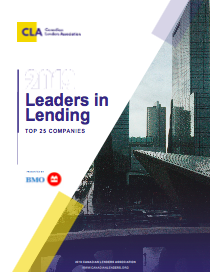 The Canadian Lenders Assocation (CLA) received 124 nominations for these awards from leaders in lending across the country. The CLA’s goal is to support access to credit in the Canadian marketplace and champion the companies and entrepreneurs who are leading innovations in this industry.
The Canadian Lenders Assocation (CLA) received 124 nominations for these awards from leaders in lending across the country. The CLA’s goal is to support access to credit in the Canadian marketplace and champion the companies and entrepreneurs who are leading innovations in this industry.
The Top 25 finalists in this report represent various innovations in the borrower’s journey from innovations in artificial intelligence powered credit modelling to breakthroughs in consumer identity management using blockchain technologies. These finalists also represent solutions for a wide spectrum of borrower maturity and needs, ranging from consumer credit rebuilding all the way to senior debt placements for global technology ventures.
See The Leading Companies Report Here
See The Leading Executives Report Here
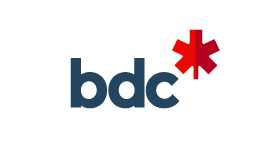 |
BDC
The 75 year old firm is the only Canadian bank devoted exclusively to supporting entrepreneurs. |
 |
Borrowell
Borrowell helps Canadians make great decisions about credit. They were the first company in Canada to offer credit scores for free, without applying for credit, and currently has over 800,000 users. Eva Wong and Andrew Graham were the joint recipients our the CLA’s awards in 2018. |
 |
Clearbanc
Clearbanc offers a new approach to capital access for entrepreneurs that uses AI to determine funding terms with a focus on unit economics and repayment through revenue share as a way to get founders access to the capital they need to fuel their growth. |
 |
CreditSnap
CreditSnap is a best in class pre-qualification and cross selling engine to deliver highly relevant pre-qualified loan offers to CreditSnap banks and CUs. |
 |
Dealnet Capital
Dealnet Capital services the home and retail sectors providing end-to-end financing plus innovative technology and communication solutions. |
 |
Espresso Capital
Since 2009, Espresso Capital has provided over 230 early and growth stage technology companies with founder friendly capital. Espresso offers lines of credit and term loans to enable entrepreneurs to grow their businesses without dilution, board seats, or personal guarantees. |
 |
Financeit
Financeit is a market leading point-of-sale consumer financing provider, servicing the home improvement, vehicle and retail industries. |
 |
First West Capital
First West Capital is a leader in Canadian mid-market business funding. First West Capital helps ventures acquire and transition through innovative junior capital financing. |
 |
Home Trust
Home Trust Company is one of Canada’s leading trust companies. Home Trust offers Canadians a wide range of financial product and service alternatives, including mortgages, Visa cards, deposits and retail credit services. |
 |
Inverite
Inverite is the first Canadian designed, developed and focused real-time bank verification service. With coverage for over 240 Canadian FIs. |
 |
IOU Financial
Based in Montreal, IOU Financial provides small businesses throughout the U.S. and Canada access to the capital they need to seize growth opportunities quickly. |
 |
Lending Loop
Lending Loop is Canada’s first and only regulated peer-to-peer lending marketplace focused on small business. |
 |
Magical Credit
Magical Credit has been helping Canadians consumers get approved for quick and simple short term personal loans since 2014. They offer personal loans up to $10,000 regardless of the borrowers past financial issues or credit. |
 |
Manzil
Manzil is the market leader in the manufacturing and distribution of Islamic Financial products for Canadians who wish to balance material pursuits with their spiritual obligations. |
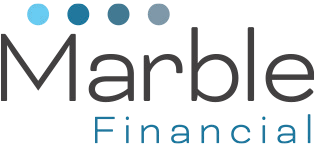 |
Marble Financial
Marble Financial uses smart technology and socially responsible lending practices to help Canadians rebuild credit once their past debt has been settled by a consumer proposal. |
 |
Owl
owl.co is a customer insight engine that helps financial institutions make better decisions. By connecting to tens of thousands of trusted data sources, Owl is able to instantly aggregate and synthesize millions of data points to learn more about customers and entities. |
 |
Paays
Paays is a Canadian eCommerce financing solution for a new generation of digital consumers seeking “point of inspiration” financing. |
 |
PayPal Canada
PayPal Canada recently announced a new SMB loan offering in Canada – a quick application process that can approve an applicant in minutes and transfer funds in one to two business days. |
 |
Progressa
Named by CB Insights to the 2018 Fintech 250, a list of the world’s top fintech startups, Progressa is Canada’s fastest growing financial technology lender focused on changing the way pay cheque to pay cheque Canadians access and build credit. |
 |
Shopify Capital
In its effort to become a one-stop e-commerce shop, Shopify Capital allows Shopify business owners to secure funding through revenue sharing on daily sales. |
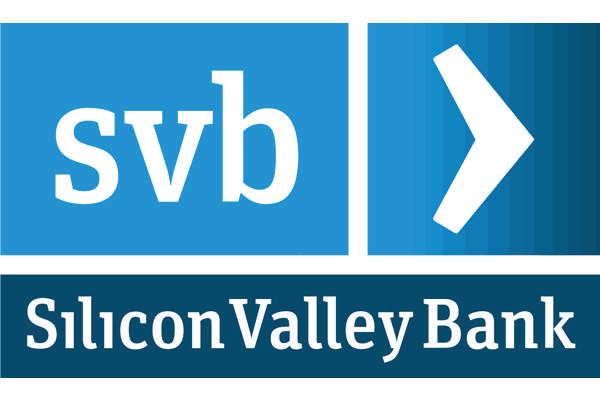 |
Silicon Valley Bank
For more than 35 years, Silicon Valley Bank (SVB) has helped innovative companies and their investors move bold ideas forward, fast. SVB provides a full range of financial services and expertise to companies of all sizes in innovation centers around the world. |
 |
Spring Financial
Spring Financial is a subsidiary of Canada Drives, one of the leading brands for auto financing in Canada. Spring provides accessible solutions for Canadians to establish a positive payment history. |
 |
Thinking Capital
Thinking Capital is a leader in the Canadian Online Lending space, leveraging technology to be at the forefront of the FinTech industry. Since 2006, they have helped more than 14,000 small-to-medium sized Canadian businesses reach their full potential |
 |
Uplift
Uplift’s mission is to make travel more accessible, affordable and rewarding by enabling travel providers such as JetBlue, American Airlines, and United to offer flexible payments to their customers. |
 |
Venbridge
Venbridge is a leading Canadian venture debt firm. Venbridge provides SR&ED, grant and digital media financing and consulting. |

Lendio Says There’s Been a Strong Uptake Of Sunrise
November 6, 2019 Last week Lendio announced that its bookkeeping and invoicing service, Sunrise, had partnered with WePay, an integrated payments business of JPMorgan Chase, to form the freemium product Sunrise Pay.
Last week Lendio announced that its bookkeeping and invoicing service, Sunrise, had partnered with WePay, an integrated payments business of JPMorgan Chase, to form the freemium product Sunrise Pay.
Stemming from an acquisition in Q1 of this year, Sunrise, formerly Billy, was picked up by Lendio after the company realized many of its customers who were small business owners were struggling to manage their accounts and invoices.
As such, Lendio CEO Brock Blake claims that there’s been a strong uptake of Sunrise amongst their clients. “They love that it goes out and pulls your bank data every day. That you can sync your credit card to it. That it is a double-entry accounting system. And that it does all your invoicing, your profit and loss, and balance sheet.”
The service is free to Lendio customers, with tiered versions that offer human bookkeepers being available to those willing to pay. Sans such add-ons however, the base product will allow small business owners to collect payments faster through WePay’s streamlining of the payments process.
“Simplifying the invoicing and payments processes for small business owners means they have more time to spend growing their operations,” said WePay VP of Marketing Jennifer Lewis. “WePay’s partnership with Lendio will help small businesses across the country to grow, create jobs, and increase their economic impact.”
Lenders, Leaders, and Las Vegas: Money20/20 Review
November 3, 2019 Two things arrived in Las Vegas last month: the first being an unusual dip in local weather, with temperatures dropping to the low forties at times and woolen hats making an appearance; the second being Money20/20.
Two things arrived in Las Vegas last month: the first being an unusual dip in local weather, with temperatures dropping to the low forties at times and woolen hats making an appearance; the second being Money20/20.
Now in its seventh year, the conference runs smoothly to the point of being habitual, a trait several attendees mentioned to me when asked how they felt about the 2019 edition.
Running from Sunday the 27thto Wednesday the 30th, each day offered a different focus. The first of these being alternative finance, blockchains, and cryptos. Here, leaders from LendingClub, Kabbage, and OnDeck, among others, took to the stages to discuss issues ranging from strategies in the face of a recession to AI in lending. Running throughout were conversations about where cannabis banking regulation was headed and what can be done to prepare. Of note was Jontae James of NatureTrak, who spoke from the Leadership Lodge Stage, pitching his company as a solution to compliance issues facing lenders who want to work with cannabis companies.
The following days contained a mix of subjects, with Monday featuring many events relating to payments and entrepreneurship; Tuesday being the day for cybersecurity, regulation, and banking; and Wednesday closing the show with various talks on emerging technologies. Among the highlights of these were a talk from David Marcus of Calibra on the currency’s efforts to alter the financial landscape, a discussion on growth in emerging markets from Ant Financial’s Douglas Feagin, and words from BlueVine’s Eyal Lifshitz on the needs of small businesses.
 Outside of the stages where these were held was the main expo hall. Dotted with booths and stands, the narrow pathways that were carved out by these were lined with a mix of businesses.
Outside of the stages where these were held was the main expo hall. Dotted with booths and stands, the narrow pathways that were carved out by these were lined with a mix of businesses.
In overwhelming numbers though were companies offering identity verification services. A growing industry in today’s increasingly online world, their presence dominated the hall, with it being hard to turn around without being offered a pamphlet on the importance of knowing who your customers are and how much it will cost to confirm their existence and authenticity.
And while walking through the hall and stopping at stalls to talk offered pleasant and informative conversation, there was an underlying tenseness to some of the chatting. Perhaps it was the unrelenting air conditioning that caused this? Or the endless stream of coffee available had rattled some nerve endings? Or maybe it was the frequency with which an oncoming recession was referenced in the titles of talks?
Who knows, what is likely though is that if it is the last of these possibilities, in the case of a “looming crisis,” as one event labelled it, what was talked about in Vegas may not stay in Vegas.
BlueVine to Enter Banking in 2020
October 28, 2019 BlueVine Capital, the Redwood City-based alternative funder, has announced today that it will launch its BlueVine Business Banking product in 2020, which will offer checking accounts that come with debit Mastercards, checks, and ATM access exclusively to small businesses. And just like many of the new competitors in the banking space, BlueVine Business Banking will be app-based, with access also being available through an online dashboard.
BlueVine Capital, the Redwood City-based alternative funder, has announced today that it will launch its BlueVine Business Banking product in 2020, which will offer checking accounts that come with debit Mastercards, checks, and ATM access exclusively to small businesses. And just like many of the new competitors in the banking space, BlueVine Business Banking will be app-based, with access also being available through an online dashboard.
With the financial infrastructure and regulatory framework being provided by The Bancorp Bank, BlueVine is the next alternative finance company to look toward becoming a bank, a move which has proven difficult for companies who already tried, such as SoFi and Square.
“Historically, banks have under-invested in small businesses and as a result, small businesses have been left with products and services that don’t meet their needs,” said BlueVine CEO and Co-founder Eyal Lifshitz in a press release that claims only 9% of small businesses believe their banks meet all of their needs. “Credit is a core part of banking and with the addition of checking accounts to our existing suite of financing products, customers can have a truly seamless banking experience.”
Such seamlessness spawns from BlueVine’s goal to promote an integrated and instant banking model, Lifshitz told me. “No more waiting for ACH for two days, or for wires to come in. You press a button, you draw from your line of credit, and magically it’s in your checking account … It’s the way that we believe it should be. The fact that it’s not currently like this is incredible in our eyes. This is what we believe the future looks like.”
BlueVine Business Banking will offer customers 1.00% interest rates on their savings and aims to cut out many of the fees associated with checking accounts, as Lifshitz explained that there will be no monthly, excess, or ACH charges; and that wire fees will be a fraction of what they cost with traditional banks.
“We feel we have the ability to build a true small business bank. Finally, one that is built and designed for small businesses rather than one that is having them as the third or fourth priority on the list, which many of the larger banks do … We believe the reason we’re here providing alternative finance is because banking is broken, and our goal is to build better banking, not just financing, but overall better banking.”
Is The Definition Of Accredited Investor Ripe For Change?
October 26, 2019
 The definition of accredited investor, which the SEC is tackling this year, is causing a fair amount of debate.
The definition of accredited investor, which the SEC is tackling this year, is causing a fair amount of debate.
At issue is the fact that under federal securities laws only persons who are accredited investors may participate in certain types of securities offerings.
As it now stands, to be deemed an accredited investor, a person needs to earn income of more than $200,000 ($300,000 with a spouse) in each of the prior two years and reasonably expect to earn the same for the current year. Alternatively, the person needs to have a net worth of $1 million or more (alone or with a spouse), excluding the value of a primary residence.
The goal of these rules, of course, is investor protection. In theory, the rules are supposed to ensure investors are sophisticated enough to invest in riskier investments and, on top of that, have adequate cushioning against the risk of financial loss.
The trouble, critics say, is that the rules aren’t doing a very good job of achieving these objectives. There’s widespread agreement that the current definition is flawed. Where it gets trickier is in deciding how it should be fixed.
 There are some who say the current bar is too high, others who say it’s too low. Some contend that the wealth-based test should be scrapped altogether in favor of a sophistication test. Others promote a sliding scale approach to investing in riskier offerings. This would allow all investors to participate, but in increments that are proportional to their wealth—similar to what happens in the crowdfunding arena today. Some industry players support a combination of measures, a sophistication test in connection with a sliding scale, to maximize investor protection and still open the playing field for others who can’t participate today based on their income or net worth.
There are some who say the current bar is too high, others who say it’s too low. Some contend that the wealth-based test should be scrapped altogether in favor of a sophistication test. Others promote a sliding scale approach to investing in riskier offerings. This would allow all investors to participate, but in increments that are proportional to their wealth—similar to what happens in the crowdfunding arena today. Some industry players support a combination of measures, a sophistication test in connection with a sliding scale, to maximize investor protection and still open the playing field for others who can’t participate today based on their income or net worth.
The varying opinions are likely to be debated by the SEC as it reviews the accredited investor definition, which it’s required to do every four years by a provision in the Dodd-Frank Act. The SEC is taking the opportunity to do a broad-based review of the regulatory framework for investing in alternative assets; the accredited investor definition is just one of the areas on its docket to examine. The comment period for this review ended on August 30th.
At this point, what the SEC actually decides to do about the accredited investor definition is anybody’s guess. The thrust of these conversations is likely to focus on what constitutes an appropriate degree of protection, which is where many of the disagreements—and alternative suggestions on how to best accomplish this— come into play.
VETTING THE VARIOUS OPINIONS
On one hand, consumer advocates want to maintain the highest degree of investor protection possible. The concern is that consumers generally don’t have enough prowess or information to safely invest in unregistered offerings, which can carry more risk than registered investments.
“We don’t want the definition to be any weaker than it is now because that would do the vast majority of consumers a disservice,” says Brian Young, public policy manager at the National Consumers League. “With these exempt products, there are a lot of unknown variables and there’s a lot more vulnerability,” he says.
One suggestion that’s being proposed is to raise the wealth and income levels to adjust for inflation. It’s a step in the right direction because it would further limit who is eligible to be considered an accredited investor, says Barbara Roper, director of investor protection for the Consumer Federation of America. “The levels haven’t kept pace with inflation since they were set,” she says.
This alone, however, wouldn’t be sufficient to protect investors, consumer advocates say, since there are plenty of wealthy people who have little to no investment prowess.
“Just changing it to correct for inflation doesn’t change it to correct for sophistication and still places investors at risk,” says Ed Mierzwinski, who oversees U.S. PIRG’s federal consumer program, helping to lead national efforts to improve consumer credit reporting laws, identity theft protections, product safety regulations and more.
On this point consumer advocates and industry professionals seem to agree: that limits based on income or net worth aren’t all that useful.
 Roper of the Consumer Federation of America gives the example of a 64-year-old who has $200k in income or $1 million of assets in his or her retirement accounts. This doesn’t mean he or she is financially literate, let alone sophisticated enough to take part in certain types of riskier alternative investments, she says. “That would be an inappropriate investment recommendation if it were made by your broker or investment advisor,” she says.
Roper of the Consumer Federation of America gives the example of a 64-year-old who has $200k in income or $1 million of assets in his or her retirement accounts. This doesn’t mean he or she is financially literate, let alone sophisticated enough to take part in certain types of riskier alternative investments, she says. “That would be an inappropriate investment recommendation if it were made by your broker or investment advisor,” she says.
Some industry professionals also find fault with the wealth test, but, unlike consumer advocates, they’d like to see more investors allowed to participate, not fewer. It’s not right, they contend, that a wide range of highly educated people are prevented from investing in certain offerings because of arbitrary limits on net worth and income.
Many promising investment opportunities are not even being offered to a huge majority of American investors, based on the standards that exist today, according to Nat Hoopes, executive director of the Marketplace Lending Association, an industry trade organization.
“By harmonizing and simplifying complex rules and adjusting the current accredited investor standards, my hope is that the SEC will find that they can permit many more Americans to gain access to a wider range of well regulated investment opportunities, without leaving those citizens exposed to fraud or abuse. Done right, changes from the SEC in this area will help to promote more equality of opportunity in our economy, without adding new red tape,” he says.
Brew Johnson, co-founder and chief executive of PeerStreet, an online platform for investing in real estate debt, says it’s “crazy” that people who are highly educated—such as MBAs, accountants, attorneys and other businesspersons can’t invest in certain offerings simply because they don’t have the income or wealth levels. He takes issue with the fact that he didn’t qualify to invest on his own platform when it was first getting off the ground. Some of his employees today also don’t qualify to invest in the platform they are helping to build, which is troubling, he says.
“You don’t want people to make terrible decisions. But the idea that the average person is too dumb to make decisions with their money…is offensive,” Johnson says. Today, there’s much more readily available information and transparency—a significant change from when the rules were first put in place—when only the largest investors had access to the types of information necessary to make critical investment decisions, he says.
Johnson doesn’t take issue with the goal of protecting investors from getting into things they don’t understand. Rather, he says, “I don’t believe wealth is a determiner of sophistication.”
ALTERNATIVE PROPOSALS TO A WEALTH-BASED TEST
That’s where another idea being floated by members of the Marketplace Lending Association and others may come in. The thought is to create a new way to measure an investor’s level of sophistication and ability to withstand loss. An example of this could be some kind of test to identify investors who are deemed to have sufficient investment prowess, despite falling below the SEC’s threshold based on wealth or net worth, to participate in certain types of offerings.
It’s an option that, if adopted, could open up the playing field to additional investors—while still trying to accomplish the SEC’s goal of investor protection, industry participants say.
Ryan Metcalf, head of U.S. Regulatory Affairs at Funding Circle, says the Financial Industry Regulatory Authority Inc. (FINRA) could develop a test to be administered online when an investor who doesn’t meet the wealth or income bar wants to invest. This would allow quick-decisions to be made. People who want to invest a few thousand dollars shouldn’t have to do it in person; this would be too onerous, he says.
 There could even be different tests based on what investors are seeking to invest in, says Mark Atalla, owner and managing director at private lending firm Carlyle Capital.
There could even be different tests based on what investors are seeking to invest in, says Mark Atalla, owner and managing director at private lending firm Carlyle Capital.
For a private placement in a mortgage fund, there could be questions related to the risks involved there, whereas for a private placement in a start-up technology company, there could be other types of questions pertaining to risk. The goal would be to ensure the investor has a sufficient level of understanding about the particular products they are considering.
Otherwise, Atalla says, there’s too much room for people to lose on a large scale. “These are people’s livelihoods you’re responsible for at the end of the day,” he says. “I think it’s important for investors to understand what they are really doing.”
Some industry professionals say there may be too many practical limitations for this type of an assessment to work. Certainly details would have to be worked out including what the scope of the test or tests should be. Decisions would also have to be made about who would be in charge of creating and administering a test or tests and how and where they would be administrated, among other things.
In theory, if someone can pass a test to show he or she is knowledgeable about investing, the person should be able to invest, says PeerStreet’s Johnson, adding that there’s something to be said about people accepting personal responsibility for their decisions, provided they have been given adequate information from which to make informed, knowledgeable decisions. “The devil is in the details of what [this type of test] would look like,” he says.
Another idea being floated—that could stand on its own or be implemented together with a sophistication test—is to allow all investors to invest on a scale that’s similar to the crowdfunding exemption. Under rules adopted by the SEC in 2015, the general public now has the opportunity to participate in the early capital raising activities of start-up and early-stage companies and businesses by way of crowdfunding. Because of the risks involved with this type of investing, however, investors are limited in how they can invest during any 12-month period in these transactions. The limitation depends on the person’s net worth and annual income.
Some industry watchers say the sliding scale idea is a viable one because it would allow more investors a chance to participate in more risky offerings, while providing a safety net for loss.
This type of model has the potential to offer investors a reasonable amount of protection, says Vincent Petrescu, chief executive of truCrowd, Inc., an equity crowdfunding portal that connects startups and emerging businesses with non-accredited and accredited investors. “If you have less money, you are allowed to invest less, but you still can play your hand,” he says.
Johnson of PeerStreet also supports this approach because it allows investors who otherwise wouldn’t have access a chance to broaden their exposure to areas that could potentially allow them to increase their wealth.
Certainly, questions about this approach persist as well. What should the investment limits be? Would it depend on the type of investment? Would investors need to self-certify as they do in crowdfunding, or would their information need to be verified by a third party? These questions and more are also likely to be probed more deeply during an SEC review.
The Marketplace Lending Association would also like employees of private funds to qualify as accredited investors for investments in their employers funds. The trade group contends that a private fund’s employees likely have sufficient access to the information necessary to make informed decisions about investments in their employer’s funds.
The suggestion would be for the SEC to consider adding a new category of the definition to include “knowledgeable employees” of “covered companies” as those terms are defined in Rule 3c-5 of the Investment Company Act.
Industry watchers are hopeful to have some clarity on these issues within the coming months, so stay tuned.
“The SEC’s mandate is to protect investors, which sometimes is needed,” says Petrescu of truCrowd, the equity crowdfunding portal. “There needs to be checks and balances,” he says.
LendIt China 2019 is Canceled
October 23, 2019 LendIt Fintech has officially announced that there will be no conference in China this year after 3 long years in the country. A blog post written by LendIt Fintech co-founder Peter Renton explained that calamitous events engulfing the peer-to-peer lending industry there, namely the abundance of fraud, and the government’s waning tolerance, has led them to believe that no lending companies will be interested in speaking, sponsoring or even attending this year.
LendIt Fintech has officially announced that there will be no conference in China this year after 3 long years in the country. A blog post written by LendIt Fintech co-founder Peter Renton explained that calamitous events engulfing the peer-to-peer lending industry there, namely the abundance of fraud, and the government’s waning tolerance, has led them to believe that no lending companies will be interested in speaking, sponsoring or even attending this year.
“We will regroup in 2020 and hopefully will be able to bring our unique event back to China,” Renton wrote.
The decision only applies to their Lang Di Fintech China event. Their US event is scheduled to take place in New York this year on May 13-14 at the Javits Center. That event will be immediately followed by deBanked’s Broker Fair 2020 at the brand new Convene at Brookfield Place on 225 Liberty Street in New York on May 17-18.
Federal Judge Rules New York’s “Win” Against OCC’s Fintech Charter Nullifies The Fintech Charter Concept Entirely
October 21, 2019 The Office of the Comptroller of The Currency took a gamble with a federal judge in a lawsuit brought by the New York Department of Financial Services (DFS) and lost. On Monday, Judge Victor Marrero ruled that the OCC must “set aside” its special purpose (fintech) national bank charters entirely, not just for those with a nexus to New York.
The Office of the Comptroller of The Currency took a gamble with a federal judge in a lawsuit brought by the New York Department of Financial Services (DFS) and lost. On Monday, Judge Victor Marrero ruled that the OCC must “set aside” its special purpose (fintech) national bank charters entirely, not just for those with a nexus to New York.
The outcome is a byproduct of a ruling issued on May 2nd where the OCC had sought to dismiss the challenge from the onset. DFS was somewhat victorious then in that the case was allowed to proceed, be litigated, and eventually tried. But the OCC felt the case was lost before it had begun because “the Court [had already] ruled on the issue of the law at the heart of the case: whether, under the National Bank Act, OCC has the authority to issue special purpose national bank charters to financial technology companies that do not accept deposits.”
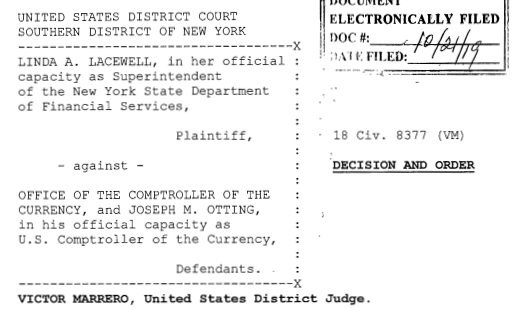 The Court made it clear, that “OCC does not have the authority because the relevant language in the National Bank Act unambiguously defines ‘the business of banking to include deposit-taking.”
The Court made it clear, that “OCC does not have the authority because the relevant language in the National Bank Act unambiguously defines ‘the business of banking to include deposit-taking.”
As a result, OCC negotiated with DFS to reach an agreed upon final judgment in DFS’s favor. The only remaining question was to what level of defeat the OCC would concede. OCC argued a judgment should preclude only New York companies from applying for a fintech charter while the DFS argued it should apply beyond New York’s borders to all 50 states.
On Monday, the judge went with DFS’s version, pointing out that ordinarily prevailing on an Administrative Procedure Act claim, as OCC had indeed consented to judgment on, would mean that the agency’s order would be vacated, not that the plaintiff would win some special relief.
It is hereby ordered, adjudged and decreed that:
OCC’s regulation 5 C.F.R. 5.20(e)(1)(i), is set aside with respect to all fintech applicants seeking a national bank charter that do not accept deposits.
DFS Superintendent Linda A. Lacewell issued an official comment on the ruling:
This decision makes the financial well-being of consumers from New York and around the country a priority. It reflects the rational conclusion that DFS and other state banking regulators have the expertise to provide the strict supervisory oversight and enforcement of anti-money laundering and consumer protection statutes and regulations that non-depository financial service providers are required to follow. The decision stops OCC’s attempt to usurp state authority by establishing a federal fintech regulatory framework at the expense of consumers. Going forward, DFS will continue to be a fierce advocate for consumers in New York and nationwide.
Salaries For All, Even For Gig Workers
October 16, 2019 “If we don’t solve the problems, there’s just a nightmare coming.”
“If we don’t solve the problems, there’s just a nightmare coming.”
This is how Trezeo’s CEO and Co-founder Garrett Cassidy views the work that he and his company are doing. Created in 2016 with the aim to provide support to self-employed people via income smoothing, Trezeo offers workers whose income streams may be irregular the opportunity to have structured and regular paydays similar to those who earn a salary. And with the number of self-employed in the UK currently at approximately five million, as well as projections showing that the majority of US workers will be freelancers by 2027, the company sees its efforts as essential to solving future problems. “There’s a lot of noise around the gig economy,” Cassidy asserted. “But the world is moving that way and we’re very much like ‘that’s fine, you can push back all you want, it’s going that way and we need to create the services that will work for these people.’”
The way it works is that Trezeo serves as an alternative lender, offering regularly paid funds to the customer’s account in exchange for their income that comes in at a later date. A major difference between it and other alternative lenders though is that Trezeo does not charge interest on these advances, instead collecting its revenue from a weekly membership fee of £3.
“We want to allow them to build their own financial resilience and also start looking a bit more useful for traditional financial institutions to engage with,” Cassidy explained. “Our ultimate vision is if you choose to be freelance or self-employed why should you cut yourself off from financial security, why should you trade flexibility for security, and, therefore, that’s the whole ethos of the income smoothing.”
Beyond this service Trezeo has plans to include additional features, such as an income verification system that would help workers be approved for large loans, like mortgages, from banks; as well as an opt-in pension, where instead of being committed to paying a fixed amount each pay cheque, customers could pay 5% of their total income for that period. Trezeo has already gotten the ball rolling with such expansions with the release of its personal accident and disabilities insurance, which covers customers for £300 per week for six months in the case that they are unable to work.
While it may sound as if self-employed and freelance workers are signing up for Trezeo to be their surrogate employer, Cassidy is quick to emphasize that this is instead a new system built to reflect the opportunities presented by technology, distant but reminiscent of the employment structures that came before.
“We’re trying to recreate [the structure] in a way so that a self-employed person controls it and over time can decide what they want … We’re not trying to make them employees, we’re very careful about that, but we’re trying to make it an employee-like experience for them so that they can very easily manage their finances and see them like an employee traditionally would … Platforms are making it easier for people to take the choice of flexibility.”
Speaking to Cassidy in Trezeo’s Irish office in the National Digital Research Centre, an early stage investor in tech companies, we’re snuggly located close by St. James’s Gate Brewery, where the cobbled streets are filled with the nutty and barley-laden smell of Guinness being brewed.
From here is where the development team operates, whereas the risk, sales, and marketing teams work from their London office, with the UK being their only market at this time. However Cassidy assured me that the company is looking interestedly abroad to Western Europe and America with plans to expand.
“This is a very big niche globally,” Cassidy remarked. “And as we’ve gone along, we’ve realized how much of an impact we can have.”





























